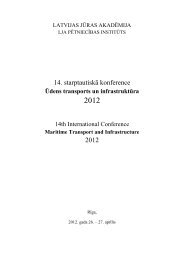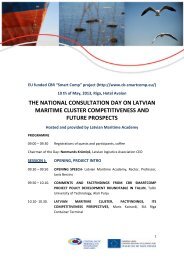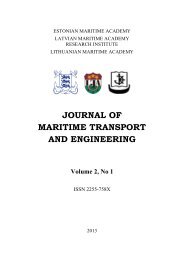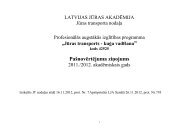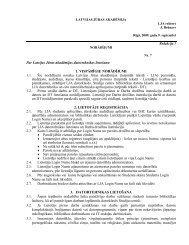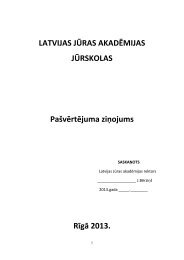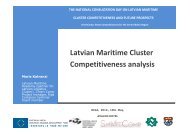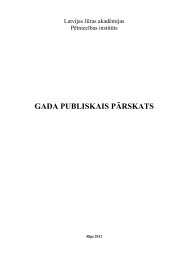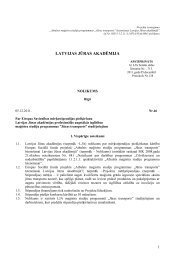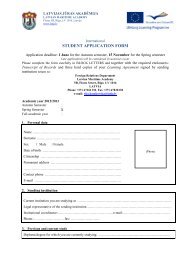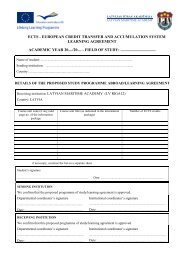Latvian Maritime academy
Latvian Maritime academy
Latvian Maritime academy
Create successful ePaper yourself
Turn your PDF publications into a flip-book with our unique Google optimized e-Paper software.
It is indicated [21] that “On the other hand, it is very difficult to teach a topic that has little if any<br />
relevance, as both the students and the instructors recognize that the time spent mastering this subject is<br />
wasted.” As an example, many nations continue to teach and test their deck license candidates on Radio<br />
Direction Finder fixes or how to obtain an OMEGA fix, an obsolete navigational aid and a skill that they<br />
will never use at sea in the pursuit of their profession.<br />
Many major maritime nations such as the Netherlands represented by the “Willem Barentsz<br />
<strong>Maritime</strong> Institute” which the authors have had the privilege to visit have totally reduced the credit hours<br />
required to teach celestial navigation to a “by knowledge” situation, and not at the management level. As<br />
obtaining a proper celestial fix is subject to weather conditions and from the authors’ personal experience,<br />
overcast skies persisted in some cases more than five days, while modern satellite navigation systems<br />
would operate properly in all weather conditions.<br />
Some may argue that these skills must be always held in hand, in case of GPS or GMDSS systems<br />
failure. It is obvious to all persons in the maritime industry that for successful, proper, and economical<br />
vessel operations, the reliability of these systems is definitely required. This reliability is provided by the<br />
accuracy, punctuality and continuity regulated for GMDSS. Furthermore, most vessels now have more<br />
than one GPS receiver, as the cost is minimal also, portable GPS are also available.<br />
At this stage, the authors would take an opportunity to recommend that other maritime curriculum’s<br />
such as the subject of maritime signalling should be deleted entirely because it is slow, limited in<br />
effective range, and frankly, with the elimination of a radio officer on board and infrequent use of<br />
signalling by officers, there is no need for such a module.<br />
Training subjects<br />
Training onboard has its potential drawbacks. If training and assessment are to be done onboard,<br />
how would <strong>Maritime</strong> Administration supervise, monitor, and approve such exams while ship is at sea as it<br />
is required by the STCW? And, if assessment is to be carried out onboard then who will exactly supervise<br />
the procedures? B. K. Lima [16] states “if objective criterion is not applied, proficiency demonstration<br />
has the potential to become troublesome due to subjectivity of the demonstrations.”<br />
Furthermore, how do we expect heavily burdened officers to conduct training and assessment<br />
onboard while the issue of fatigue is continuously mentioned as the major cause of most maritime<br />
causalities? Accordingly the IMO and the ILO responded by setting standards for what is known to be the<br />
rest hours required for seafarers on board ships. Nevertheless, ship-owners criticized those rest hours, as<br />
J. R. Binnington [3] mentioned that rest hours adopted by STCW are considered as unreasonable, due to<br />
nature of work at sea. In addition, there is no guidance on the format in which hours of rest records may<br />
be kept due to the nature of some shipping lines.<br />
In addition, there are still variations of institutions which should conduct the examinations, as in<br />
some nations examinations are conducted entirely by the national <strong>Maritime</strong> Administrations, while other<br />
nations MET institutes takes care of the examinations procedure.<br />
Some parties issue documents with expiry date of five years. Hence, they require seafarers to retrain<br />
every five years, while others takes it for granted that there is no expiry date providing that an adequate<br />
training is done on board. Then how can we globalize and harmonize MET if different standards are still<br />
applied?<br />
STCW encourages vocational MET education and discourages academic education for onboard jobs.<br />
The consequences of that, is the knowledge of seafarers would be of a very limited scope. Hence it will<br />
not be easily for mariners to find jobs ashore [20].<br />
Also it is required by the STCW that there should be communication and submition of reports to the<br />
IMO every five years in order to make sure that the adopting and implementing of a quality system by the<br />
national maritime administrations is always monitored. Unfortunately, some MET institutes did the same.<br />
Another topical issue regarding the tanker training and familiarization is very important due to the<br />
special nature of those ships and the major pollution accidents that nations suffer from. Nonetheless, such<br />
training requirements are not presented in the tabular form among other competencies. In addition, It is<br />
vitally important to mention that the STCW somehow neglected the training requirements for ratings, as<br />
the majority of the new provisions in the revised STCW convention concern competence standards for<br />
officers.<br />
31



